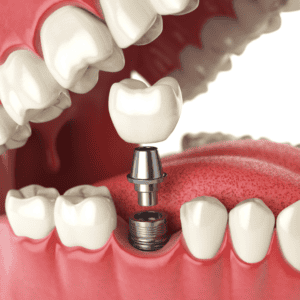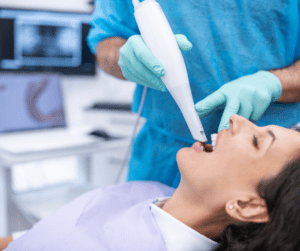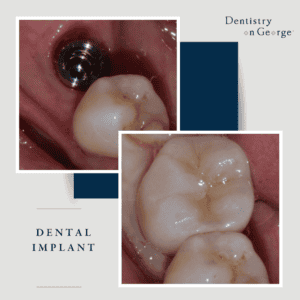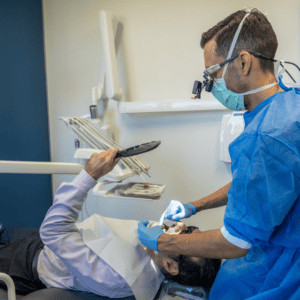If you’ve ever lost a tooth—or several—you’re not alone. Tooth loss is a common issue that affects millions of people worldwide due to factors like decay, injury, or disease. Fortunately, dental technology has advanced significantly, offering effective and reliable solutions for restoring your smile. In this blog, we’ll explore what dental implants are, how they work, their benefits, and what you can expect from the procedure. Here, at Dentistry On George, in Brisbane CBD, we can provide dental implants from start to finish. Also, coming soon – we can provide intravenous sedation for those who would rather be sedated for the dental implant procedure.
What Are Dental Implants?
Dental implants are artificial tooth roots that provide a foundation for replacing missing teeth. They are typically made from titanium, a material that is biocompatible, meaning it integrates well with the bone. The implant itself is a small, screw-like post that is surgically placed into the jawbone. Once it fuses with the bone—a process called osseointegration—it can support a crown, bridge, or denture.

How Do Dental Implants Work?
- Initial Consultation and Planning: Before the procedure, your dentist will conduct a thorough examination, including X-rays and send you for a CT scan, to assess the quality and quantity of your jawbone. This step is crucial to ensure there is enough bone to support the implant.
- We will take a full dental and medical history to ensure you are a suitable candidate for dental implants. All this information helps plan your implant. Our lab technicians can use digital impressions of your mouth taken here at the practice along with your CT scan to create custom-fitted guides to ensure accurate implant placement.
- We will also plan how you would like the procedure carried out – under local anaesthesia alone, or with the help of sedation. We will assess your suitability for sedation. Here at Dentistry on George, we are excited to be offering intravenous sedation in-house by our very own Dr Kathryn Al-Dhafeeri very soon.
- Placement of the Implant: The implant is placed into the jawbone during a minor surgical procedure. Over the following months after placement, the implant will fuse with the bone in a process that typically takes 3 to 6 months.
- Attachment of the Abutment: Once the implant has integrated with the bone, an abutment—a small connector piece—is attached to the implant. This abutment will hold the replacement tooth.
- Placement of the Crown: Finally, a custom-made crown is placed on top of the abutment. This crown is designed to match the color and shape of your natural teeth, providing a seamless and aesthetically pleasing result.

Benefits of Dental Implants
- Natural Appearance: Dental implants look and feel like natural teeth. The custom crowns are designed to blend seamlessly with your existing teeth, providing a natural and attractive appearance.
- Improved Functionality: Implants restore full chewing function, allowing you to eat and speak with confidence. Unlike traditional dentures, implants do not slip or shift, offering stability and reliability.
- Durability: With proper care, dental implants can last a lifetime. They are highly durable and resistant to decay, making them a long-term solution for tooth replacement. However, the crown attached to the implant will wear over time, like any other crown and will require replacement at some stage.
- Preservation of Bone Structure: Implants help maintain the integrity of your jawbone. When a tooth is lost, the underlying bone will resorb and shrink away. Implants stimulate the bone just like natural teeth, helping to prevent bone loss and maintain facial structure.
- Enhanced Comfort: Unlike dentures, which can cause discomfort or require adhesives, implants are a permanent solution that feels more like your natural teeth. This can greatly enhance your comfort and confidence.
- Do not damage adjacent teeth: Unlike bridges, implants are stand-alone and do not require adjacent teeth to attach to. This means no damage is done to the teeth either side of the implant. In addition, implants can be placed in places where bridges would be unsuitable, for example the last tooth where there is no tooth behind to support a bridge.

What to Expect During and After Your Dental Implant Procedure
- During the Procedure: The implant placement is typically done in an outpatient setting with local anesthesia (and with sedation if required/suitable). You may experience some swelling and discomfort following the surgery, but this can usually be managed with over-the-counter pain medications.
- Recovery: The healing period varies depending on individual factors, but most people resume normal activities within a few days. It’s important to follow your dentist’s aftercare instructions to ensure proper healing and integration of the implant.
- Long-Term Care: Dental implants require regular oral hygiene practices, including brushing, flossing, and routine dental check-ups. With proper care, your implants can last a lifetime, contributing to your overall oral health and well-being.

Conclusion
Dental implants represent a significant advancement in restorative dentistry, offering a durable, natural-looking solution for missing teeth. Whether you’ve lost a single tooth or multiple teeth, implants can help restore your smile and confidence. If you’re considering dental implants in Brisbane City, consult with our professional and qualified dentists to determine if this innovative solution is right for you. Please bear in mind that all surgical procedures carry risk. This solution may not be suitable to everyone. Please discuss all the pros and cons, associated costs and future dental requirements with your dental team.
By investing in dental implants, you’re not just replacing a tooth—you’re investing in a brighter, healthier future for your smile.
References
- Australian Dental Association
- Website: teeth.org.
- Includes who is eligible for a dental implant and alternative treatment options
- American Academy of Implant Dentistry (AAID)
- Website: aaid.com
- Offers comprehensive information about dental implants, including benefits, procedures, and patient resources.
- American Dental Association (ADA)
- Website: ada.org
- Provides detailed information on dental implants, including care and maintenance tips.
- National Institute of Dental and Craniofacial Research (NIDCR)
- Website: nidcr.nih.gov
- Offers research-based information on dental implants and other oral health topics.
- Mayo Clinic
- Website: mayoclinic.org
- Provides patient-friendly information on dental implants, including benefits, risks, and aftercare.
- WebMD
- Website: webmd.com
- Features articles and resources on dental implants, including what to expect before, during, and after the procedure.
- Journal of Oral Implantology
- Website: joionline.org
- Publishes peer-reviewed research articles on dental implants and related topics.
- Colgate Professional
- Website: colgateprofessional.com
- Provides insights and professional advice on dental implants and other dental care topics.



